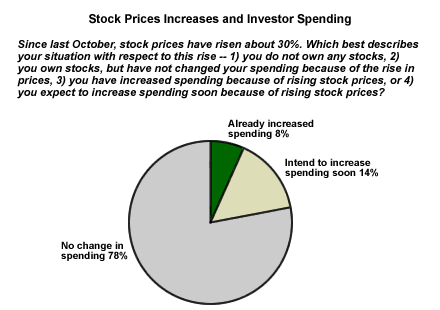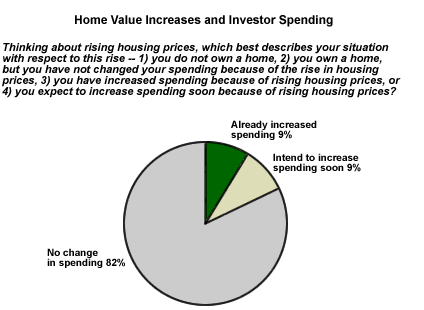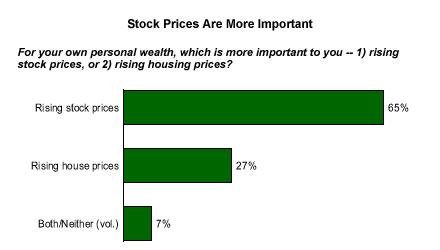As the equity markets soared during the late 1990s, economic experts made much of the "wealth effect" -- the idea that as the value of stocks surges upward, investors see their wealth increase rapidly and increase their propensity to spend as a result. Although economists continue to debate the reality of the wealth effect, many experts feel that it was not only real in the sense that spending jumped as the equity markets soared to new highs, but that just the opposite effect took place as the markets plummeted (see "‘Wealth Effect' Means Many Will Work Longer" and "Can the Stock Market Boost Consumer Spending?" in Related Items).
The most recent UBS/Gallup Index of Investor Optimism poll* provides evidence that supports the idea that significant increases in individual investor net worth levels -- wealth gains -- positively affect consumer spending intentions among some investors. The poll also indicates that, at least among some consumers, "wealth effects" are produced not only by increasing stock prices, but by rising housing prices as well.
Stock Gains Influence Some Consumers
More than one in five investors (22%) who currently own stocks say the surge in stock prices during most of the past year is affecting their spending intentions. Eight percent say they are spending more because of rising stock prices. Another 14% say they intend to increase their spending soon because of the wealth gains resulting from higher stock values.

Housing Gains Increase Spending Among Some Homeowners
Eighteen percent of investors who own their own homes say that increasing housing prices are affecting their spending intentions. Nine percent have already increased their spending due to rising house prices and 9% intend to do so soon.

Stock Gains More Important
On the occasions in which stock prices have plunged during the past couple of years, some observers suggested that housing price gains have offset those losses. However, two-thirds (65%) of investors tell Gallup that rising stock prices are more important to their personal wealth than are rising housing prices (27% of investors say that rising house prices are more important).

Why Are Consumers Spending?
Despite signs of economic growth and significant increases in consumer spending, the U.S. economy lost another 93,000 jobs in August. Why are consumers continuing to spend even as the jobs situation continues to deteriorate?
Tax cuts and low interest rates are clearly part of the answer. But these new investor data suggest that another part of the explanation may lie with the return of the positive wealth effect. Increasing home prices and surging stock prices have had a significantly positive impact on the net worth of many investors and consumers, and refinance activity and lower tax rates have increased the cash available to many people as well.
Given these positive developments, it is not surprising that a significant percentage of investors feel wealthier and are increasing their spending. And many are spending significantly -- one-third (33%) of investors who have increased their spending say they did so to make a major purchase that they would not have made otherwise.
On the other hand, about one in five employees (19%) tell Gallup that they are worried about being laid off, and 9% say they are worried that their company will send their jobs overseas. These employees could be cutting back on their spending, and deferring major purchases they may have made otherwise.
At this point, however, it appears that the increases in consumer spending stimulated by the wealth effect are more than offsetting any decreases in spending related to unemployment fears. The key question for the future of the economy is how long these trends will continue.
*Results for the Index of Investor Optimism -- U.S. are based on telephone interviews with a randomly selected U.S. sample of 803 adult investors, aged 18 and older, with at least $10,000 of investable assets, conducted Aug. 1-14, 2003. For results based on these samples, one can say with 95% confidence that the maximum error attributable to sampling and other random effects is ±4 percentage points. In addition to sampling error, question wording and practical difficulties in conducting surveys can introduce error or bias into the findings of public opinion polls.

